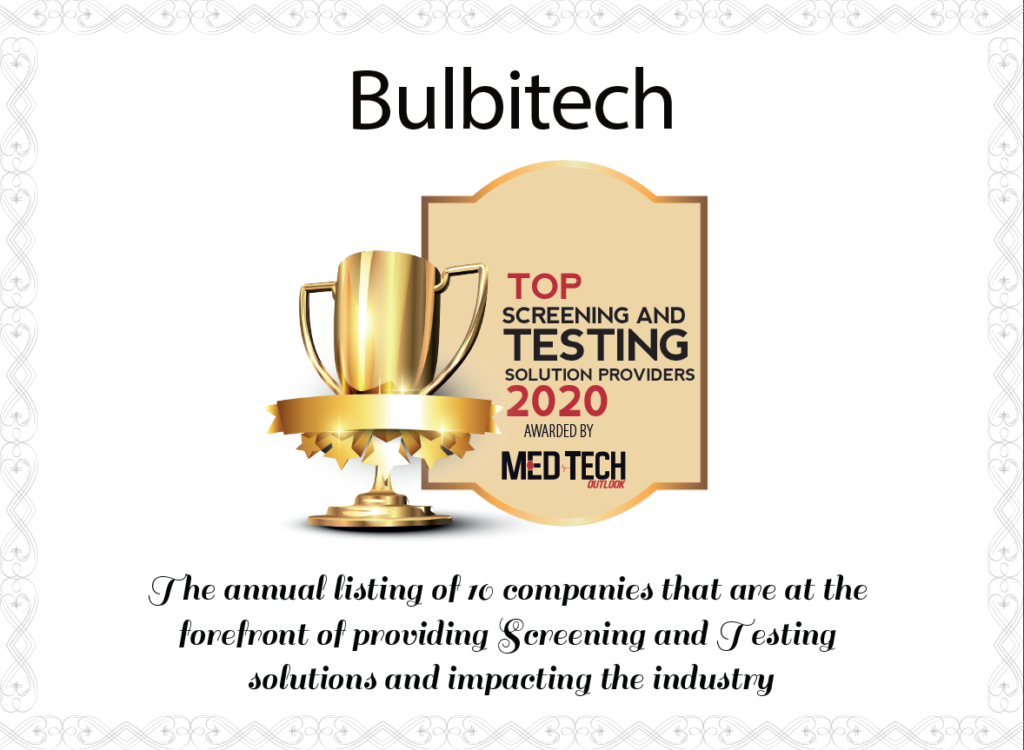A Single Neuro-ocular Diagnostic Device for Multiple Examinations
2021 starts with Medical Tech Outlook editorial board assessing and shortlisting Bulbitech’s solution in their top 10 Screening and Testing Solution provider in Europe. Pls read the interview they had with our CEO Dennis Hens.
In the past decade, rapid technological advancements have significantly improved healthcare systems with new modalities of treatments introduced to diagnose medical conditions.
As a result, the morbidity of various non-communicable and chronic diseases such as diabetes, cancer, and cardio-vascular has been reduced significantly. However, there are still many challenges plaguing healthcare systems, particularly in ophthalmology services, which require immediate reform. Currently, the lack of accessibility to specialized ophthalmic centres and unequal distribution of ophthalmologists in proportion to ageing population particularly in low- and middle-income countries are key factors that contribute to the increased number of people with vision impairment. Furthermore, in most developing countries, expensive treatments and lack of universal clinical guidelines to manage the ocular cases are the main drivers.
According to a 2019 report by WHO, globally, 2.2 billion people are visually impaired, of whom atleast 1 billion could have been prevented with early diagnosis and treatment.
“Our goal is to help ocular healthcare professionals meet with the increasing demand for eye-care with a neuroophthalmic diagnostic support device for the early detection of neuro-ophthalmic disorders, based on eye-tracking technology,” begins CEO of BulbiTech Dennis Hens.
BulbiTech is improving patient’s access to neuro-ophthalmic care by providing neuro-ophthalmic clinicians with a diagnostic support tool and a point-of-eye-care platform to decentralize and automate neuro-ophthalmic diagnostic testing.
The company’s revolutionary offering is a combination of hardware-based on eye-tracking technology, BulbiCAM, combined with its proprietary software and algorithms, BulbiHUB—that aid in early detection of ocular disorders, reducing patient chair time, labour remittance and treatment costs.
“The BulbiCAM can be operated by anyone in the Opthalmic space. It is a single tool capable of conducting multiple tests to generate objective clinical results needed for a thorough assessment of the patient’s neuro-ophthalmic condition,” explains Hens.
BulbiCAM offers the ocular healthcare professionals multiple neuro-ophthalmic examinations – Visual, Pupil, Ptosis and Saccade with a Calibration free and 400 FPS eye-tracking test setup.
BulbiCAM’s flexible spaceefficient design allows patients to be tested in a position of their comfort at an already overcrowded diagnostic room. Tests are conducted Binocularly with two screens for independent presentation of each eye in an accurately timed synchronized fashion.
The clinical outcomes of tests conducted with the BulbiCAM are assessed by the BulbiHUB software, which enables users to quickly and objectively add the neurological part of the eye examination to their diagnostic workflow with a clinical dashboard overview of results in one place.
BulbiTech’s proprietary software can also process and share clinical outcome data from eye examinations conducted with third party ophthalmic devices.
In addition to creating an efficient workflow, BulbiTech develops algorithms to detect early-stage neuro-ocular dysfunctions by anonymously collecting data of eye movements from patients, resulting in the world’s biggest database of eye movements.
With Covid-19 Pandemic adversely effecting health care delivery— the current need for social distancing to protect healthcare providers, and patients has necessitated the need to consider new methodologies for ophthalmic evaluation.
For instance, the close physical proximity between patient and clinician during the slit-lamp examination presents an opportunity for transmission of Covid-19.
To avoid disruption of healthcare during pandemic outbreaks, BulbiTech integrates teleophthalmology consultations into a clinical workflow by providing remote access to patient’s test results for neuroophthalmic specialists.
Having completed a clinical validity study on the reliability and stability of data from its tests, BulbiTech is expected to be marked CE – Certified before the end of 2020.
For 2021, the firm plans to enter partnerships and establish subsidiaries to launch its product commercially in Europe and late into the year with FDA approval in the North American market.
Currently, BulbiTech is raising capital and laying out the ground-work for CE – Certification of more tests such as Acuity, Cover, Vergence, Strabismus and Nystagmus examinations into its product.
“We’re elevating eye tracking to the next level from a functional to a diagnostic tool,” concludes Hens.

